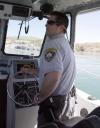A Cronkite News Service Weekend Special
Armed with new law upping penalties, authorities hunt for drunken boaters
NOTE: ADDS new 13th and 14th grafs with comment from boater. This story moved Wednesday, March 25. We recommend it for weekend use.
With BC-CNS-Drunken Boating-Box
Photos Available (thumbnails, captions below)
By MICHELLE PRICE
Cronkite News Service
LAKE HAVASU CITY _ Cruising around Lake Havasu in his patrol boat, Sgt. Doug Schuster tells story after story of partiers and mayhem he’s seen as a boating safety supervisor with the Mohave County Sheriff’s Office.
“We’ve had people blow 0.20; we’ve had people blow 0.30,” Schuster said, referring to blood-alcohol levels well beyond the legal limit. “We’ve had people out here on one weekend get arrested three times for OUI. The same guy.”
Heading into prime time for boating season, Schuster and others in law enforcement have a new tool to discourage boating under the influence: a state law stepping up penalties for the offense.
As of Jan. 1, penalties for drunken boating are roughly equal to driving under the influence. Offenders face at least 10 days in jail for the first infraction, but a judge can suspend the sentence if a person completes a court-ordered treatment program.
Penalties for subsequent offenses, extreme OUI (operating under the influence) and aggravated OUI also mirror DUI laws, which have mandatory minimum sentences that judges cannot reduce.
Sen. Linda Gray, R-Phoenix, who shepherded the legislation, said that because boating injuries and deaths are just as devastating on the water as they are on land, the penalties for drinking and boating had to reflect that.
“As long as you have a designated driver, as in a vehicle, then you’re not going to get in trouble,” Gray said in a telephone interview. “Pretty much the same as operating a vehicle.”
But Lt. Richie Sloma of the Lake Havasu City Police Department said the new law won’t affect many boaters in Lake Havasu because the number of OUIs has decreased recently as law enforcement increased patrols and checkpoints.
“Last year it dropped significantly as we see more and more people going to designated drivers, just like they would if they were going out to a bar on a Friday or Saturday night,” Sloma said.
In 2007, the latest year for which data were available, there were 357 OUI arrests in Arizona, compared with 535 in 2006, according to the Arizona Game and Fish Department, one of the law enforcement agencies that patrols Arizona’s lakes and rivers. Alcohol-related accidents dropped from 41 in 2006 to 33 in 2007, and alcohol-related deaths dropped from 14 in 2006 to 8 in 2007.
“We’re trying to do as much preventative education as we can,” Joe Sacco, a law enforcement specialist with Game and Fish, said in a telephone interview. “We want people to go out and have a good time, but we want them to be responsible.”
Ron Gibson, a retiree who travels the country in his RV and had his fishing boat out on Lake Havasu on a recent weekday, said the stiffer penalties aren’t enough.
“I think that’s a minimum,” he said. “It wouldn’t hurt to have it stricter.”
While operating any type of vehicle under the influence is dangerous, boaters are particularly vulnerable in accidents, said Lt. Alan Nelson, who supervises the Marine Enforcement Division of the La Paz County Sheriff’s Office.
“In a boat, everybody’s just sitting there,” he said in a telephone interview. “There’s no airbags; there’s no seatbelts.”
Nelson said OUI is a big problem in the Parker Strip, a 16-mile stretch of the Colorado River patrolled by his division, and the problem doesn’t stop at the lakeshore.
“Arizona is known as a trailer-boat state,” Nelson said, meaning that most operators tow their boats to the water and back home at the end of the day. “That drunk boater becomes a drunk driver.”
Nelson said the new laws will only help officers.
“We think it will put out more of a deterrent effect,” he said. “It puts out a message that the state is serious about the problem.”
But while the Legislature has bolstered OUI laws, it also dealt a blow when lawmakers cut $500,000 recently from the Law Enforcement and Boating Safety Fund to help close the budget deficit. The fund, a little more than $2 million last year, is used to pay boating officers’ salaries and other costs.
Nelson said lawmakers are sending a mixed message with the cut.
“The Legislature has said that they’ve had it with accidents, so we’re going to step up the laws, and pretty much in the next breath they say we’re going to take 25 percent of the money used to enforce these laws,” he said.
^___=
PHOTOS: Click thumbnails to see full-resolution images and download; caption information is in the file under File>File Info.

CAPTION FOR BC-CNS-DRUNKEN BOATING: Deputy Ed Trafecanty, with the Mohave County Sheriff’s Office, patrols Lake Havasu. A new Arizona law toughens penalties for those who boat while intoxicated, and the prime boating season getting under way now provides its first major test. (Cronkite News Service Photo/Michelle Price)

CAPTION FOR BC-CNS-DRUNKEN BOATING: Sgt. Doug Schuster, a boating safety supervisor with the Mohave County Sheriff’s Office, patrols Lake Havasu. A new Arizona law toughens penalties for those who boat while intoxicated, and the prime boating season getting under way now provides its first major test. (Cronkite News Service Photo/Michelle Price)

CAPTION FOR BC-CNS-DRUNKEN BOATING: London Bridge in Lake Havasu City is a gateway for boaters heading onto Lake Havasu. A new Arizona law toughens penalties for those who boat while intoxicated, and the prime boating season getting under way now provides its first major test. (Cronkite News Service Photo/Michelle Price)

CAPTION FOR BC-CNS-DRUNKEN BOATING: Lt. Richie Sloma with the Lake Havasu City Police Department said a new Arizona law carrying stiffer penalties for boating while intoxicated won’t affect many boaters at Lake Havasu because checkpoints and increased patrols already have curtailed drunken boating. (Cronkite News Service Photo/Michelle Price)